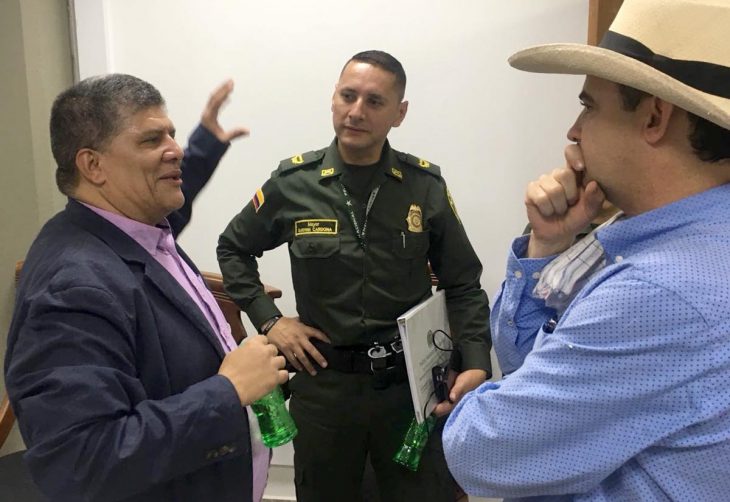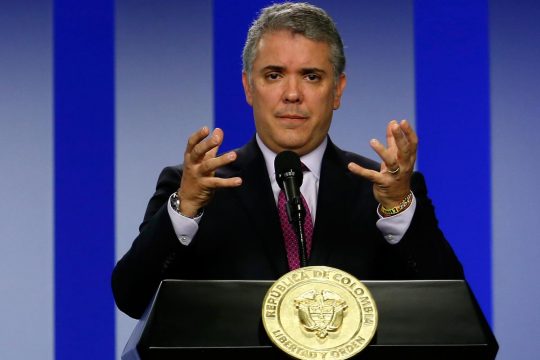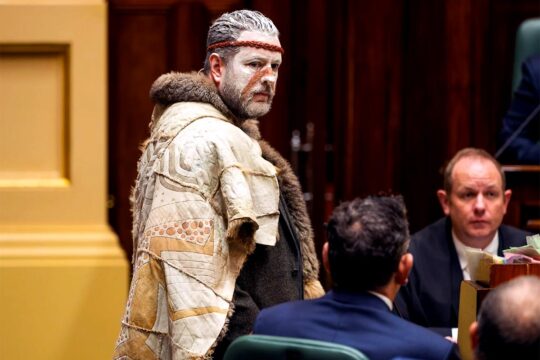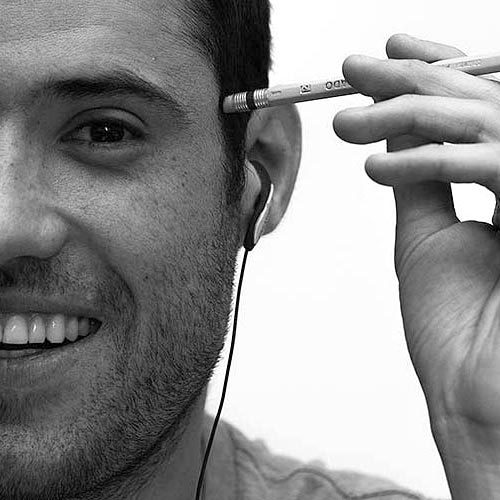As Ómar Restrepo became the first lawmaker from the former Revolutionary Armed Forces of Colombia (FARC) to lead debate on a bill on the floor of the Colombian Congress two weeks ago, his fellow Congressman César Eugenio Martínez cheered him on. These two politicians from rival parties have forged an improbable partnership after decades of war had set them on a collision course.
Restrepo – until recently known by his nom de guerre Olmedo Ruiz – joined FARC’s ranks at age 15 and led that guerrilla’s 36th front which operated in the mountains of northern Antioquia until the 2016 peace deal that saw 13,000 rebels disarm. He was part of the former guerrilla’s peace negotiating team in Havana, Cuba, and was elected in 2018 to the House of Representatives as part of a FARC party that changed its name but kept its old acronym.
Martínez, a dairy farmer and conservative career politician who opposed the peace deal, grew up in a middle-class rural family in the same area near Colombia’s industrial heartland where Restrepo operated. He was also elected to Colombia’s lower chamber last year as part of the Democratic Center party founded by former president Álvaro Uribe that led current President Iván Duque to power.
Over the past year, they have found common ground on rural issues. While Restrepo led the peace talks’ pilot projects on humanitarian demining and coca crop substitution in Briceño, Martínez has been an advocate of small-scale farmer associations, pension rights for rural inhabitants and investment in science and technology to boost agricultural production, all items contained in the peace deal.
JusticeInfo talked to both about the state of Colombia’s peace deal and how to solve the current crisis after one faction of the former guerrilla decided to rearm.
In the 1980s nobody lamented when persons were killed. Today everyone rejects this and this is a legacy of the peace deal.
JUSTICEINFO.NET: In your view what has been successful from the Peace Agreement and what worries you about it?
MARTÍNEZ: I would highlight that most former rebels have acknowledged that war is not the way forward. That people who waged it reached this conclusion after so many years is an achievement not merely of a peace deal but of Colombia’s conscience. I have heard them say that monopoly of arms belongs to the state, which is the biggest achievement of a civilized society.
My concern is that war and revolution are being used by some persons today as pretexts for drug trafficking, which is a damaging war without ideology. The Colombian state has been historically unable to provide security throughout the entire country and the violence we’re seeing now has no political aim. Current criminal activities are even more threatening than previous violence.
RESTREPO: There has been a culture of acknowledging that we must advance towards reconciliation and strengthening democracy. This has galvanized Colombians in defence of life. In the 1980s nobody lamented when persons were killed, but rather justified it. Today everyone rejects this and this is a legacy of the peace deal. The discourse of war sells less.
I am concerned however that there are still groups that resist to these changes demanded by society and are bent on the continuation of war. In the end they don’t allow us to turn the page.
We need to be able to build collectively and send these messages of reconciliation to the rest of Colombians.
What has been your experience working close to your political opponents in Congress?
MARTÍNEZ: Having the ability to forgive is a test in life. It’s a slap in the face for someone like me who was so critical of the peace deal and now greets them and shakes their hand. I’m not trying to befriend them though, nor do I want to insult or treat them poorly. I simply acknowledge that after so many efforts it’s worth advancing instead of going backwards.
On a personal level, it has been tough to deal with people’s rebuke over my positive personal attitude towards them. They tell me to be careful because they might kill me, that those aren’t worthy friends for me. They glance down at me, simply because I treat them well. This has allowed me to measure the size of many Colombians’ animosity towards them.
RESTREPO: There are several offensive and rude politicians that believe this discourse helps them capture an opinion vote. But there are other more moderate ones in Congress with whom, despite different perspectives and interests, we have been able to build a dialogue in which we listen to diverse arguments and seek solutions within the mechanisms of democracy, without the need to discredit adversaries.
I would love to see this in the entire country. We need to be able to build collectively and send these messages of reconciliation to the rest of Colombians.
We have been part of peace pacts involving social, political and economic actors on a local level.
In the current crisis after Iván Márquez, a key leader of FARC, abandoned the peace process late August, what can both of you do?
MARTÍNEZ: We need to strengthen the ongoing process. Duque’s government cannot fulfil the entire peace deal’s provisions, but it must guarantee minimal conditions of implementation. Demobilization is not the endgame but the way forward and we have to support it. We must take care of lower-ranking former combatants who are striving to change and whom life taught that this was not the way. And we must also give legitimacy to the former commanders who remain in the agreement, because they exemplify the conclusion that war is not the answer.
This government must send political messages showing it believes in these party cadres and empower them to deliver this message to their supporters. People who laid down their weapons must feel that going backwards is not an option.
This is going to have a political cost because there will be criticism from people who consider this means being soft. But I believe it’s better to advance than go backwards. We are no longer going to kill each other, we are here together in this now.
RESTREPO: We have been part of peace pacts involving social, political and economic actors on a local level, building a consensus on the need to withdraw arms from politics. I have participated in such scenarios in several small towns of Antioquia. We believe that we may take these pacts to a national level.
That could help defuse polarization and build trust, as it allows us to come together in spaces where we don’t have to agree on everything. Conflict is inherent to society, but we can resolve it through conversation. This can help create a culture of non violence that enables us to disarm our spirits and heal our wounds.
FARC cannot continue to pontificate to those of us who always respected democracy and never picked up a weapon. They’re lacking humility.
What advice would you give to your political opponents in order for the Colombian transition to be successful?
MARTÍNEZ: Those who laid down their arms must distance themselves from the name FARC. Sticking to it was an affront to victims and a mistake because they never asked for forgiveness. They should drop the name, given that there is also a guerrilla [with the same acronym] causing harm, killing policemen, candidates and social leaders. They should make a clean break.
I remember former M-19 guerrilla leader Carlos Pizarro who handed over his weapon while saying ‘Colombia, I made a mistake, forgive me’. He shot up in the polls and became a charismatic leader. We have to accept that fighting for one’s ideals is alright, but that nothing justifies violence and that armed groups caused much harm. FARC cannot continue acting as if Colombians were indebted to them and pontificate to those of us who always respected democracy and never picked up a weapon. They’re lacking humility.
If we do not bring social development both to former combatants and peasants, it will not be possible to stop many conflicts.
RESTREPO: Colombia needs full implementation of the peace deal beyond the reincorporation program for former combatants, as this is the minimum to allow transforming forces throughout the country. For example, the rural chapter would enable us to settle a historic debt with the countryside. As we open spaces of participation and dialogue, forceful protests and even violent methods would become less usual to solve differences.
To do this you need to create conditions, which is something those in power can do. This would create trust and take oxygen away from those who are still up in arms. The economy would get a boost in rural areas, which have suffered poverty and violence most. If we do not transform the surroundings and bring social development both to former combatants and peasants who live in poverty, it will not be possible to stop many conflicts, which is what happened in Colombia in the past.
Humane acts from FARC’s party bosses fill me with hope and anticipation.
What is your personal contribution for this to happen?
MARTÍNEZ: More than words, with my actions as an example of prudence and moderation. By being thoughtful and not believing I am the sole owner of truth or justice. If something hurt this peace deal it was the polarization left by former president Santos. We have turned it into such a divisive issue. But if we look at it from a human perspective it’s very important that we stop, listen around us and learn more about one another.
One also should demystify former rebels: I used to see them as soulless, conscienceless and ultimately inhuman. Even if it was a politicized and theatrical demobilization, humane acts from FARC’s party bosses fill me with hope and anticipation. I don’t want to deny myself the hope that one day we will understand that we cannot destroy among ourselves. We’re all here now. Ómar and I are not going to kill each other.
RESTREPO: My contribution is understanding that the changes needed by Colombia be created in a different way. I am trying to do so at Congress and in our political party, as well as by calling on former combatants to continue to unite around peace. The ideas we used to defend with weapons, we now fight for through legal avenues.
I feel that even when there is a crisis, like with Márquez’s rearming, people rally around and defend the peace deal even more. Because 10 or 15 years ago there were violent deaths every day. We still see problems in several regions today, but people see that conditions have improved and that we have been closing the conflict. If the government keeps its word in implementing the accord, we will manage it to close it entirely.
Fifty-three years of confrontation have allowed us to see that the armed conflict neither advanced nor receded. We fell into a vicious circle that only caused disaster.








